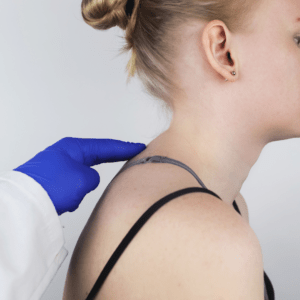Imagine life without being able to balance correctly… 🤔
We would fall over every time we moved! 🤕
Balance is therefore super important to our everyday life. So, how do we balance? ⚖️
The medical term behind balance is ‘proprioception’. This is also known as ‘muscle sense’ or ‘joint position sense’. It is a sense that we each have, which helps determine how we move in space – it is essential for balance and movement. 🏃♂️
Test this out by closing your eyes and holding out your arm. Even with your eyes closed, you know where your arm is because you have sensors everywhere in your body call proprioceptors – they help your body understand where it is in space, even without using your eyes. 👀
These proprioceptors work in all areas of the body, including your ankles, knees, pelvis, neck, and inner ear. If we twist an ankle, for instance, we can damage the proprioceptors in our ligaments. This makes it easier to lose our balance and twist our ankle again in the future. 🦵
If we have an ear infection, this can affect the balance link between our ears, eyes, and neck (a system that allows us to hear a noise, turn and look). Issues with this link can lead to experiencing vertigo. 😵
Proprioception is a subconscious sense. We often balance without thinking about it 🙆♀️. This makes a loss of balance or vertigo very disruptive as we need to use our conscious brain to keep us upright.
At Inspired Health we use chiropractic techniques to help the brain remember where parts of the body are in space and how to use them in a more stable way 🧠. For example, adjusting the ankles can help the brain become aware of the ankle proprioceptors again and help rebuild our balance. We also use massage and exercises to strength the core and balance centres to help you get back to a well-balanced version of yourself.
If you are experiencing vertigo, we do extra tests to assess your health. If it is a condition like Benign Proxomyl Positioning Vertigo (BPPV) we can use a technique call the Epley’s manoeuvre to help the ear, eye and neck connection to improve. 👂🙆♂️
As we all get older, balance plays an increasingly important role in keeping us active and healthy. Working on balance now can set up us to move with confidence later in life! 💆♀️
If you’re feeling off balance, it may be time to come in for an assessment. Repeated injuries or persistent poor posture can be addressed with more efficient proprioception. Give us a call today and start the journey to re-centring yourself and getting your body back on track. 🙌





